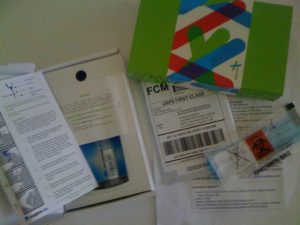
23andMe warns its DNA health-risk reports do not diagnose health conditions. (justgrimes/Flickr)
After halting 23andMe from using DNA tests to determine disease risks in 2013, the Food and Drug Administration has approved the company to do so with 10 conditions.
The FDA gave the first authorization for an at-home test for individuals to learn their genetic predisposition to contract illnesses including Parkinson’s disease, late-onset Alzheimer’s and Celiac disease, which is the inability to digest gluten. Not tested is a risk for cancer or early-onset Alzheimer’s.
“Consumers can now have direct access to certain genetic risk information,” Jeffrey Shuren, M.D., director of the Food and Drug Administration’s Center for Devices and Radiological Health, said in a statement on the organization’s website. “But, it is important that people understand that genetic risk is just one piece of the bigger puzzle. It does not mean they will or won’t ultimately develop a disease.”
23andMe’s genetic testing works by shipping users a saliva collection kit, which includes a tube for the consumer to spit in. The user ships the tube back to the company’s labs and awaits results within 6-8 weeks. Users are able to choose from health and ancestry services for $199 or the $99 ancestry service.
“The FDA has embraced innovation and has empowered people by authorizing direct access to this information,” 23andMe co-founder and CEO Anne Wojcicki said in a company blog post. “It is a significant step forward for 23andMe and for the adoption of personal genetics.”
The test, which adds to 23andMe’s other health reports like carrier status and wellness, can only offer a percentage of how much risk it is for a person to develop a disease, according to Yahoo. It cannot definitively say a person will or won’t get a disease. The reports provide three different results: 0 variants detected, meaning the individual is not likely a carrier, 1 variant detected, meaning the person could be a carrier, and not determined, meaning the test may not be able to provide a result.


